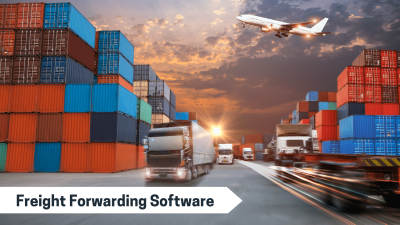Why Collaboration is needed?
Every profitable business owner and intellectual leader in their field is aware of the critical role that well-managed Logistics Software play in their business’s operational process. By integrating new Freight Forwarding Software, and supply chain management software into your core operations, you can stay ahead of the competition, outperforming customers’ expectations, and quickly grow up your company as necessary with freight forwarding software.
Today’s freight forwarders software covers the transportation gap by providing specialized knowledge, complete control, and transparency in addition to pushing your shipment from one overseas destination to another. Today’s freight forwarders are equipped with the understanding and abilities to tackle any situation and improve their field.
Regardless of the current scope and size of your company, you will always want to grow and expand. Additionally, this globalization may take place at the regional, governmental, or even global levels. By optimizing your logistics software, you may fit all the elements of your expansion that are required and, at the same time, save money and time on inventory administration and product displacement.
Utilizing the internet of things (IoT) in Logistics.
Using Internet-of-Things technologies, the complicated industry of logistics can flourish. The process of warehouse storage and port shipment to manufacturers and final consumers would be more efficient and cost-effective with the help of IoT devices. Further to read to understand logistics-related issues, IoT-based solutions, and the results of their application in supply chain management software.
Recently, logistics companies have begun to use it with the goal of lowering costs and minimizing hazards within the industry. The following are a few other Applications that the sector stands to receive from this technology:
1. Delivery from Supplier to Manufacturer: The delivery of materials from each vendor to the producer is tracked using a real-time location system (RTLS).
2. Deliveries to the Manufacturing Facility: With RTLS, truck drivers may unload the goods more easily and accurately, preventing product loss and inadvertent deliveries.
3. Tracking at the Manufacturing Facility: Materials may be accidentally mixed up as they arrive at the factory, which could result in incorrect cycle times and interrupted production.
4. Environment Sensors: Specific environmental conditions must be met to preserve the quality and freshness of sensitive commodities.
5. Data analysis: Sensors regularly gather enormous volumes of data. Using IoT solutions, this data may be appropriately organized and analyzed.
Logistics with the Application of Artificial Intelligence (AI) and Machine Learning (Ml).
One sector that heavily utilizes the solutions provided by AI and ML is logistics. Future logistics software will be significantly influenced by AI. There is no question in my mind. We have only touched on a few of the advantages of using AI and ML above. Numerous other advancements are made because of technology.
You may optimize customer service efficiency, adjust the way deliveries are structured in the warehouse, and streamline deliveries using artificial intelligence. All that is required for logistics corporations to use AI and ML solutions is a suitable vendor that has a deeper grasp of contemporary logistics technologies. As a result, nothing will stand in the way of them raising the quality of their services.
The following are some advantages that machine learning and artificial intelligence in supply chain management software bring to businesses involved in logistics, supply chains, and Freight Forwarding software.
1. Increasing the Productivity and Management of the Supply Chain: Future supply chain management systems will be heavily influenced by artificial intelligence and machine learning.
2. Increased susceptibility, and better economic standing: The full potential of AI is accelerating business performance in areas like network planning and predicting demand.
3. Enhancing Customer Experience and Factory Refinement: Artificial intelligence scheduling in supply chain management is a fantastic strategy for customer service and upholds improved consumer experiences.
Logistics, Freight Forwarding, and Supply Chain: The Amount of Crossover
The majority of logistics software participants have historically been freight forwarders who handle cargo bookings together with the origin and destination services. The ability to provide various services, such as ground transportation, warehousing, and contract logistics under one roof was the future trend, however, was recognized by these companies as global business practices changed and supply chain management software gained ground. As a result, they quickly turned themselves into acquiring the necessary capabilities and have succeeded in becoming single window service providers on a global scale.
To deal with the local circumstances successfully, a principal firm should avoid getting involved, whether it be with transportation, customs, or legal compliance. Due to the size of these businesses, 3PL logistics providers have constructed core competencies and capabilities in each of the functions Freight forwarding software, Customs Clearance, and Contract Logistics, and are outfitted with state-of-the-art technology to support overseas operations and give customers visibility at all times. The electronic interchange of data and information is crucial to the operations of 3PL organizations.
They also provide other value-added services including Purchase Order Management, Semi- and Light Manufacturing, and something else they term Integrated Logistics Services are:
1. To meet the needs of the client wherever they are, 3PL service providers are now investing in the construction of distribution networks and facilities.
2. They are enhancing their internal skills by hiring SCM Experts that have expertise in automotive logistics, aeronautical spares, and medical & environmental logistics, among other niche markets.
3. The company’s current SCM strategy attempts to shift logistics costs to transactional costs, avoiding any investments in supply chain management.
4. A major firm would not be able to invest in establishing and managing logistics services and facilities at the origin and destination.
Conclusion :
To outperform Marketing and Sales, the logistics, Freight forwarding software, and supply chain departments must work together to make sure that products are made available in every single corner of the city, state, and nation when Marketing announces them for sale. If shippers want to see their logistics business reach unmatched heights of perfection, they need increasingly strive toward synchronizing the wings of their supply chain and freight forwarding with the use of new technology solutions like blockchain, IoT, ML, and AI.
We hope you enjoyed reading this column; you can learn more about the worldwide supply chain by visiting BoxOn Logistics. To know more details https://www.boxonlogistics.com/request-demo/






COMMENTS